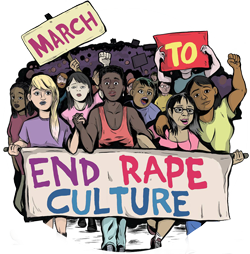A wide variety of voices, ideas and approaches are vital in dismantling rape culture. Here are five ideas for participation:
1. help out with promotion, volunteering, and/or fundraising for the march
We're busy promoting the March To End Rape Culture (MTERC) ourselves, but there's only so many of us. The wider the word gets out, the more people can choose to attend. Printable outreach materials are available from poster to handbill size. We're currently accepting new volunteers, performers and speakers!
We're also also asking for donations from organizations, from fundraisers, and from individuals help us pay for equipment rental, promotional materials, and logistical costs (MTERC has no paid staff, all of our organizers are volunteers). Every bit helps and is greatly appreciated. Past fundraisers have included clothing swaps, benefit concerts, raffles, burlesque shows, benefit brunches, and karaoke nights. If you've got something in the works let us know so we can help get the word out. You can also make a donation now!
2. plug in with one of our partner groups
Some of the critical work being done by some of our partner groups includes providing support and shelter for survivors of intimate partner/spousal violence, advocating for stronger legislation in support of survivors, offering medical and social services to the LGBTQ population, amplifying marginalized voices and spreading awareness about rape culture and its remedies. Many of these groups are also in need of supplies and donations. Here's the full list of our partners, please consult them for additional information.
3. interrupt rape culture in your daily life
The most important thing anyone can do to change rape culture is to support and believe survivors. If your first reaction when you hear about sexual assault is to doubt the person who was victimized, stop and reflect before you speak. Rape culture contains myths that, when believed, encourage people to doubt survivors and protect perpetrators. Interrupt that by educating yourself and listening to those who have suffered these violations.
If someone discloses to you that they have been assaulted, listen without judgement. Validate their feelings without asking invasive questions. You might feel compelled to ask the person questions like, "What were you wearing?" "How much were you drinking?" or "Why were you out so late?" This is victim blaming—don't do it. No matter what the answers to these questions are, rape/sexual assault/intimate partner violence is not their fault. They always have the right to consent. Your role is to listen and support. Survivors may expect people to victim blame, which can deter them from seeking the support they need.
Once you have listened and supported, you could help by asking what they want to do. If their not sure, let them know what their options are. There is no right path a victim must take after an assault. As their support person, you should let them take the lead on what they want to do next. If they want to report or if they want to get counseling, offer to go with them. This can be a scary time for them and your presence can be comforting. After your initial conversation check in with them. Ask how they are feeling and what they need from you.
The healing process may be very long and difficult. Everyone copes and respond in a unique way. Honor your loved one's healing process by respecting and supporting their decisions.
- Make sure your friends and family know that you are there to hear their story and support them in getting help to recover. Offer to accompany them to medical appointments, court, counseling, provide child care, etc. Sometimes a hand to hold, a diaper changed, or a hot meal are vital to getting through the next hour or week.
- Learn about Calling In, a method for pointing out problematic behavior which focuses on positive outcomes.
- Take an empowerment self defense class to learn new techniques for awareness, boundary setting, physical self-defense moves, and bystander intervention.
4. PRACTICE SELF-CARE
As activists it's sometimes easy to get swept up in movements and ignore symptoms of stress and fatigue for the sake of furthering our projects. Not doing as much as we ultimately want to do commonly instills guilt. As people committed to taking action against rape culture, making time to prioritize our own emotional and physical health isn't selfish—it's essential. More info on self-care for activists is available here and here.
If you're a survivor of sexual assault, intimate partner violence or an LGBTQ person in need of immediate support, phone and web chat resources are listed on our Resources page.
5. Attend the March!
Aside from all the reasons Why We're Marching, the event is a great place to address some of the above points—many of our partner groups also participate in the march and set up outreach tables, as well as speaking and performing. It's a great event for someone looking to learn more about ongoing projects in Philly that address rape culture. We haven't forgotten self-care at the march either; therapists are available on-site free of charge for anyone experiencing intense reactions at the event.
Everyone in favor of stopping rape culture is encouraged to march, and those those who want to learn more are welcome to attend as well—so feel free to invite your friends, co-workers, family, classmates, peers, and anyone else who might be interested.













